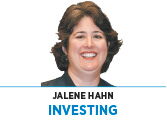Subscriber Benefit
As a subscriber you can listen to articles at work, in the car, or while you work out. Subscribe Now Have you ever wondered why some people seem to be able to save money effortlessly?
Have you ever wondered why some people seem to be able to save money effortlessly?
I am not one of those people. I struggle to keep my spending impulses under control. As I read and learned more about handling money and finances, I was able to see how my actions undermined my long-term goals, and I was able to make changes.
Since 1982, Olivia Mellan has been a groundbreaker in the field of money psychology, couples’ communication, stress management and conflict resolution. She is the author of “Money Harmony: A Road Map for Individuals and Couples,” “Overcoming Overspending: A Winning Plan for Spenders and their Partners” and “Money Shy to Money Sure: A Woman’s Road Map to Financial Well-Being.” Sometimes, it is not enough to know your money personality, but your partner’s, as well, then be able to communicate and appreciate your differences.
Mellan identifies five basic personality types: amasser, avoider, hoarder, money monk and spender. Assuming you are totally honest with yourself, you can generally identify your dominant trait. If you can’t, ask your significant other or a close friend. There’s no judgment associated with these labels. It is a matter of self-understanding and a recognition that this is how we approach money. Once we have this recognition, we can decide if our actions are helping achieve our goals or if we might want to modify our behavior.
Here’s my interpretation of these money types:
Amassers. They are very aware of money and are willing to spend and invest. For them, money is about their self-worth and power. As investors, they are looking for quick returns over a short time frame.
Avoiders. They don’t think about money. They feel easily overwhelmed or confused by talking or thinking about money and therefore don’t pay attention to financial matters. “If I ignore it, it will go away.”
Hoarders. (Also known as security seekers or savers.) On the surface, you might think these are the same as amassers. The basic difference is the reason for accumulating wealth. They worry that what they currently have will disappear. While amassers will spend and invest, hoarders are too fearful. They tend to be overly cautious investors and not to stray far from Treasury bills or CDs.
Money monk. These people feel as though money is the root of all evil and that, if you focus on money, you are somehow shallow or morally bankrupt. These thoughts can come from religious or political teachings. These individuals tend to be more interested in socially responsible investing.
Spenders. Think of people who are generous—to themselves and others. The concern is that they can be generous to a fault and be irresponsible. If their natural tendency is left unchecked, it would be easy to take on too much debt. They spend to feel important, loved or validated.
We might behave differently in certain situations and our preferences might change over time. I used to be a spender/avoider/money monk. I married a hoarder. He has curtailed my spending, and I have freed him from hoarding and encouraged him to enjoy the fruits of his hard work.
In the early years of our marriage, we didn’t have the income or savings to be spenders, and his hoarding tendencies established a strong financial foundation. I would encourage you to find some quiet time over the summer to reflect on what you want from life and whether your current behaviors bring you closer to that goal or whether you need to make modifications.•
__________
Hahn is a certified financial planner with WWA Planning and Investments. She can be reached at 812-379-1120 or [email protected].
Please enable JavaScript to view this content.
